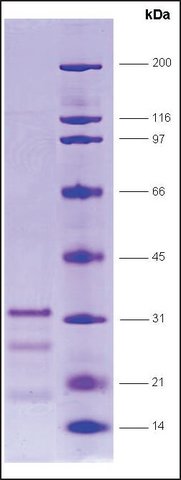您的位置:首页 > 产品中心 > PPARβ, ligand binding domain (165-441) human
PPARβ, ligand binding domain (165-441) human

| 产品编号: | 4139874 |
| 规格: | recombinant, expressed in E. coli, ≥70% (SDS-PAGE) |
| 包装规格: | 10 μG |
| 产品类别: | 进口试剂 |
| 品牌: | Sigma-Aldrich |
| 优惠价: | 立即咨询 |
产品别名
PPARβ, ligand binding domain (165-441) human
MGC3931
PPARB
NUCI
FAAR
NUC1
NR1C2
NUCII
基本信息
| NACRES | NA.26 |
| Biochem/physiol Actions【生化/生理作用】 | There is evidence that a group of closely related nuclear receptors, called peroxisome proliferator-activated receptors (PPARs), may be involved in chronic diseases such as diabetes, obesity, artherosclerosis and cancer. The PPARs were first cloned as the nuclear receptors that mediate the effects of synthetic compounds called peroxisome proliferators on gene transcription. It soon became clear that eicosanoids and fatty acids can also regulate gene transcription through PPARs. They bind a specific element in the promoter region of target genes only as a heterodimer with the receptor for 9- cis retinoic acid, RXR (retinoid X receptor). Binding of the ligand of either receptor can activate the complex, but binding of both ligands simultaneously is more potent. Three PPAR isotypes have been identified: α, β (also called NUC1) and γ. PPARα is expressed most in brown adipose tissue and liver, then kidney, heart and skeletal muscle. PPARγ is mainly expressed in adipose tissue, and to a lesser extent in colon, the immune system and the retina. PPARβ is found in many tissues but the highest expression is in the gut, kidney and heart. PPARβ has received little attention, probably because of the lack of a connection with important clinical manifestations. However, recently PPARβ has been linked to colon cancer, among other functions. PPAR regulates the expression of acyl-CoA synthetase 2 in the brain, linking PPARβ to basic lipid metabolism. Moreover, it probably participates in embryo implantation and decidualization. |
| Physical form【外形】 | Clear and colorless frozen liquid solution |
| Preparation Note【制备说明】 | Use a manual defrost freezer and avoid repeated freeze-thaw cycles. While working, please keep sample on ice. |
产品性质
| biological source【生物来源】 | human |
| recombinant【重组】 | expressed in E. coli |
| Assay【测定】 | ≥70% (SDS-PAGE) |
| form【形式】 | frozen liquid |
| mol wt【分子量】 | ~33.2 kDa |
| packaging【包装】 | pkg of 10 μg |
| storage condition【储存条件】 | avoid repeated freeze/thaw cycles |
| concentration【浓度】 | 250 μg/mL |
| color【颜色】 | clear colorless |
| NCBI accession no.【NCBI登记号】 | NM_006238Y |
| UniProt accession no.【UniProt登记号】 | Q03181 |
| shipped in【运输】 | dry ice |
| storage temp.【储存温度】 | −70℃ |
| Gene Information | human ... PPARD(5467) |
安全信息
| Storage Class Code【储存分类代码】 | 10 - Combustible liquids |
| WGK | WGK 1 |




